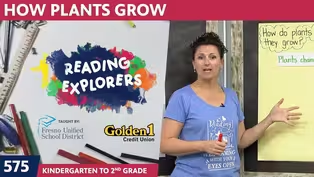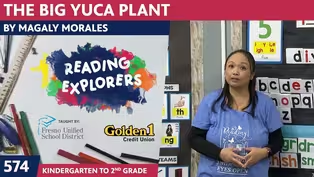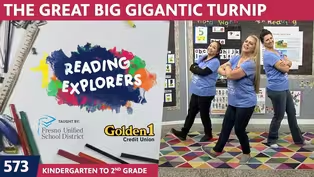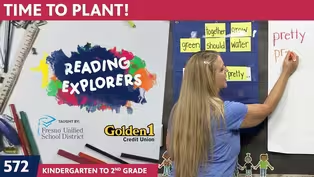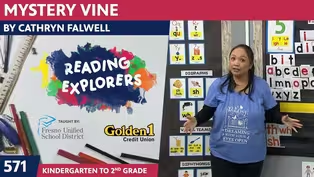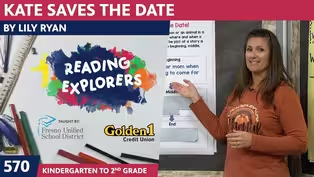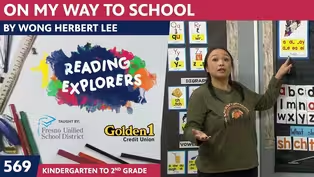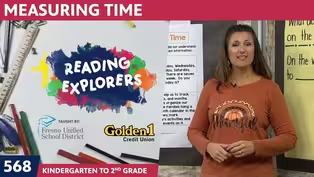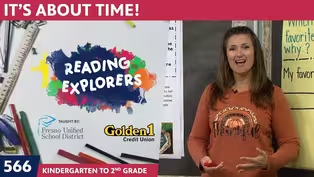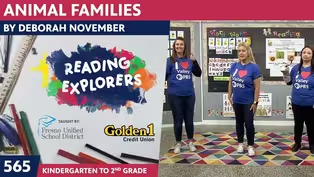
3-369: Practice Prefix, Base Word & Suffixes
Season 3 Episode 389 | 14m 11sVideo has Closed Captions
Join Mrs. Nix at Camp Discovery!
Third Grade teacher, Mrs. Nix, welcomes students back to Camp Discovery, a fun learning space packed with reading adventures & fun games!
Problems playing video? | Closed Captioning Feedback
Problems playing video? | Closed Captioning Feedback
Reading Explorers is a local public television program presented by Valley PBS

3-369: Practice Prefix, Base Word & Suffixes
Season 3 Episode 389 | 14m 11sVideo has Closed Captions
Third Grade teacher, Mrs. Nix, welcomes students back to Camp Discovery, a fun learning space packed with reading adventures & fun games!
Problems playing video? | Closed Captioning Feedback
How to Watch Reading Explorers
Reading Explorers is available to stream on pbs.org and the free PBS App, available on iPhone, Apple TV, Android TV, Android smartphones, Amazon Fire TV, Amazon Fire Tablet, Roku, Samsung Smart TV, and Vizio.
Providing Support for PBS.org
Learn Moreabout PBS online sponsorshipMore from This Collection
Valley PBS and Fresno Unified School District have partnered with Golden 1 Credit Union to create Reading Explorers Lessons for grades Pre-Kindergarten through Third grade. The daily lessons will be taught by Fresno Unified School District teachers and are created to help students practice their reading skills and reinforce lessons during distance learning.
Video has Closed Captions
Learn about the life cycle of a plant on Reading Explorers. (26m 39s)
K-2-574: The Big Yuca Plant by Magaly Morales
Video has Closed Captions
Join the Reading Explorers as we adventure into a new book The Big Yuca Plant. (26m 30s)
K-2-573: The Great Big Gigantic Turnip
Video has Closed Captions
What will happen at The Great Big Gigantic Turnip? (26m 30s)
K-2-571: Mystery Vine by Cathryn Falwell
Video has Closed Captions
The Bell has rung and the Valley PBS Classroom is open once more. (26m 32s)
K-2-570: Kate Saves The Date by Lily Ryan
Video has Closed Captions
Mrs. Nix, Mrs. Hammack and Mrs. Vang are glad to have you join her for a new day. (26m 32s)
K-2-569: On My Way To School by Wong Herbert Lee
Video has Closed Captions
Mrs. Vang is ready for a new day of phonemic awareness and reading comprehension. (26m 40s)
Video has Closed Captions
We review phonics, frequency words and more on Reading Explorers. (26m 45s)
K-2-567: Nate The Snake Is Late
Video has Closed Captions
What happens when Nate the Snake is late to school? (26m 49s)
Video has Closed Captions
It's time for school! How do you know what time it is? (26m 31s)
K-2-565: Animal Families by Deborah November
Video has Closed Captions
Welcome to the Reading Explorers lessons in the Valley PBS Classroom. (26m 14s)
K-2-564: From Caterpillar To Butterfly
Video has Closed Captions
The transformation from Caterpillar to Butterfly is a special one. (26m 52s)
Providing Support for PBS.org
Learn Moreabout PBS online sponsorship♪ Good morning to a brand new day ♪ ♪ time to learn and games to play ♪ ♪ learning things is so much fun ♪ ♪ learning is good for everyone ♪ (guitar playing) (upbeat music) - Good morning third grade.
My name is Mrs. Nix and I am so excited to be with you this morning.
As, as I can get an opportunity to help you become and support you to become amazing thinkers, readers and writers.
So I was just reading a beautiful story about the underground railroad.
And if you ever are interested in checking out books to learn more about history, I highly recommend you visit your local County library, your school library, or if you're here in Fresno Unified, you can check out the app Sora.
It's all free for us.
Okay.
Now, speaking of Sora though I also want to talk about, there's a little challenge in Fresno Unified that we've been doing and we've been tracking the number of minutes our students have been reading their stories using the Sora app.
And we have looked at all of our elementary schools and we are counting down, the top five schools for the largest number of minutes, all combined that they've read at the school site.
So, in second place this last week on our countdown, it is Ewing Elementary.
So great job Students over at Ewing, we are so proud of you and all of your hard work.
Keep it up and you can see yourself on our little shout out board again, hopefully next week.
The second piece that I want to talk about real quickly is our free activity book from PBS.
All you need to do is send me a letter.
You can do it to the address that is listed down below or if you want to do it something really easy, you can send me an email but don't forget to send me your home address and I will put an activity book in the mail for you.
And there are all sorts of fun puzzles and games that you get to play in here for it's always nice to have something fun to do while you're at home.
Okay.
Today I have three things that we're going to go through and practice together.
We have prefixes, related words and root words.
Are you ready to start?
Okay, let's warm up those brains and get everything going looking at our high frequency words.
Now high frequency words are words we come across often.
And in third grade, it's really important that you not only read them, but write them.
So practice using these as you are writing your sentences at home.
Maybe you want to make up your own sentences and put them in a journal.
I encourage you to do that.
Okay.
Let's go through and let's read them together.
Always, about, am, after, again, an, all, and, another and also.
Okay.
Third grade, we've got these two right here, all, a l l and and, a n d, to use in a sentence.
So here we go.
Let's read our sentences right here and help me put them, use our words in these sentences.
I like chocolate, vanilla ice cream.
Did you complete, of your homework?
Ooh, third grade I can almost hear you.
You're, you're shouting.
I like chocolate, and vanilla ice cream.
Maybe you do.
Maybe like a little mint in there too.
Right?
All right.
Did you complete, all of your homework?
Excellent job.
You did a wonderful job using both of those.
Okay.
So let's get started.
We're going to talk about prefixes.
Now, prefixes and suffixes and base words.
We've been talking a lot about that in third grade and it's really important that we're training our brains to identify those prefixes, those small cluster of letters that, they can't stand alone but they change the meaning of a base word.
And we want our brains to be able to see them and recognize them and know what they mean and change too.
So this week we're reviewing five of them.
These are all prefixes that we've talked about in the past.
So let's review them and then we'll apply and practice them a little bit in just a little bit.
So we've got our base words right here.
And remember, these are words that can stand alone.
Let's read them together.
We have kind, like.
heat, read or read and use.
Okay.
So if I start up here with kind, we know what it means to be a kind person, right?
What if I put "un" the prefix "un", what's my new word?
Unkind.
Well "un" means not.
So if by adding the prefix "un" to kind means that we're not kind.
So now we have a new word.
Do you see how that prefix changed the meaning?
Let's do it again.
So "dis" means not.
Our word is like, if I add "dis", what's our new word?
Dislike.
Dislike means that I don't like something.
It's not like.
Right.
Okay.
How about "pre"?
"Pre" means before.
So let's look over here.
We have heat.
Okay.
We're going to heat, maybe heat the stove and maybe the directions tell us to what's this new word, preheat.
So we need to, we need to, heat before we, maybe before we're cooking, right?
So we're going to preheat the stove.
We're going do it beforehand and then "re" means again.
So if we have read, okay, we're going to read a book.
Have you ever heard your teacher say I would like for you to, reread your book?
That means that you're going to read it again.
And the last one is, the prefix is "mis".
So "mis", when we see that at the beginning of a word, we're going to remember to think to ourselves, that means wrong.
So our word is use.
And if I put "mis" in front of it, misuse.
Ooh, have you ever been in trouble for misusing your maybe a pen or a pencil?
Maybe you weren't following directions.
Oh, Mrs. Nix has had that happen before.
It's okay, we just got to make better choice the next time.
Right?
Okay.
All right.
The second thing that I want us to practice today are related words.
They're kind of these words that are, they all belong in a family.
They have something in common and I'm going to tell you what that is.
So, words that share a common root or base word are called related words.
So that root or base word.
So let's look right here.
We have three words, uncover, recover and coverage.
What word would be the base word?
What do we see?
Uncover, recover, coverage.
Did you hear something in there?
Yeah.
Look right here.
Cover, uncover, recover, coverage.
So cover is, kind of that word that we see in all of them that makes these related words.
Okay.
What does that look like when we go through and we practice it together.
So I have a worksheet for us to look at and it has some directions.
Now up at the top you're going to see and we talked a little bit about this yesterday.
Maybe this is something that you write in a notebook, so that you have the meanings of all of these prefixes written down.
So "un" and "dis" mean not, "pre" means before, "re" means again, and "mis" means wrong.
If we have those written down, we can always go back and reference them.
So here's an opportunity for us to practice adding those prefixes to our sentences.
So it says, add the prefixes to the underlying word to complete each sentence.
Okay.
So let's look right here.
If you make something, appear you can no longer see it.
Ooh, can no longer see it.
So you can't see it.
So can not.
So it must be something with not, would it be unappear or disappear?
What do you think?
Oh, I think it's disappear too.
Good job.
Disappear, you can no longer see it.
Let's try another one.
She is, afraid and is willing to take on any challenge.
Ooh, she's willing to take on any challenge probably means that she's not afraid.
What do you think?
What prefix means not?
Will we use "dis" with disafraid?
No, that doesn't make sense, but what about, unafraid?
She's unafraid.
Good and she's willing to take on any challenge.
Let's do one last one.
A house that has been badly damaged may need to be, built.
It's probably going to have to be built again, right?
If it got damaged.
So, which prefix means again?
Can you remember it, just by yourself?
If not, that's okay.
We can look up here.
What does it mean?
"Re" means again.
So let's put, re-built.
That's our new word.
Excellent.
Okay, we're going to talk about those related words and we're looking for words that are related.
They have that common root or the common base.
Okay.
We talked about this the other day.
So rebuild, building, and builder all have build as a common base.
So down here it says, related words have a common root or base word, read each set of words and place an X over the word that is not, related to the other two.
So we want to find the one that doesn't belong.
Okay.
So we've got rearrange, arrangement and stranger.
Ooh, let's think about that for a second.
Rearrange, so I'm, I'm arranging something again.
Arrangement, still arranging something and stranger.
Yeah.
Stranger doesn't belong.
Good.
Knowingly, nowhere and unknown.
Ooh, I see this "know" right here, right there.
So nowhere, that's the wrong "know".
It's not the k, n, o, w, to like know something.
Discover, recover, and recommend.
That almost sounded like an easy one, right?
No to the recommend.
We've got recover and discover.
Good job.
Let's finish off today, just talking about root words.
Kind of what we've been practicing all day today, right?
Pulling those prefixes off and we want to do that so that we can make sense of and think about, the meanings of the words.
So let's read it in a sentence.
I only ask that you also help those less fortunate than you.
Okay.
If we don't know what fortunate means.
Well, let's think about it.
Let's find the base word, fortunate.
Well I know that "ate" is a suffix.
So let's pull that off, and what's our base word?
Fortune.
Fortune, I know that that has to do with money or I always think of gold when I think of fortune.
Right?
So if I look up here, you can also have, this up here says that we're going to be less fortunate than you.
So, it's not necessarily saying that they have less money than me, but fortunate has to do with, having some luck.
Not being excited, but having some luck.
So let's see.
I only ask that you also help those less fortunate or less lucky, than you.
So that would be something that we always want to do.
We always want to help others who are less fortunate than ourselves.
So finding that root word, making it make sense and that's going to help you with your comprehension.
All right.
So third grade, we went through three things today.
We talked about prefixes, related words and finished off with those root words so that we can comprehend.
And I just want to say, thanks so much for hanging out with me today, as you're getting ready for school.
Remember your responsible for your learning success.
So listen, ask questions and share your ideas because together we can do so much more.
I just want to say, thanks for hanging out with me today.
I had a great time and I can't wait to see you, back here at PBS tomorrow.
Have a good one.
I'll see you then.
Take care.
Bye bye.
(guitar playing) ♪ Good morning to a brand new day ♪ ♪ time to learn and games to play ♪ ♪ learning things is so much fun ♪ ♪ learning is good for everyone ♪ (guitar playing)
Support for PBS provided by:
Reading Explorers is a local public television program presented by Valley PBS
